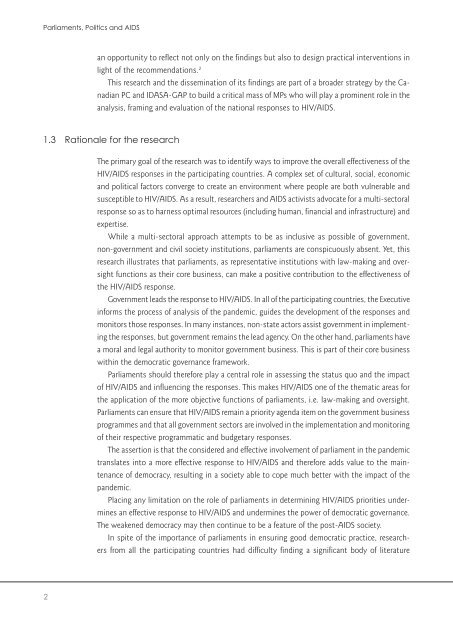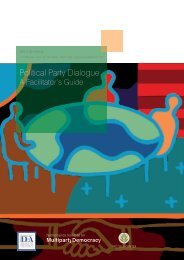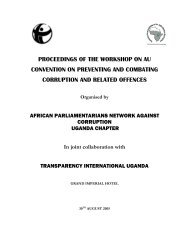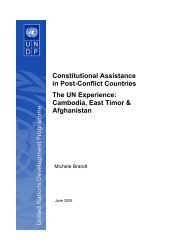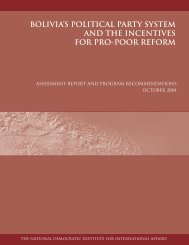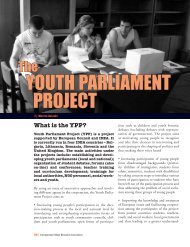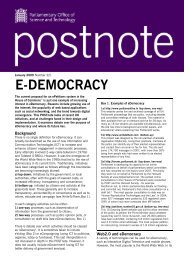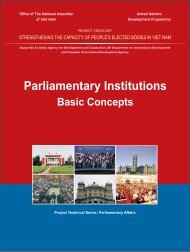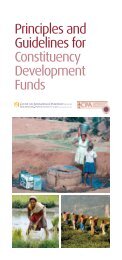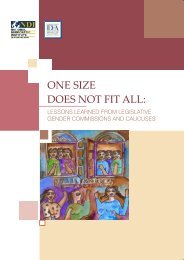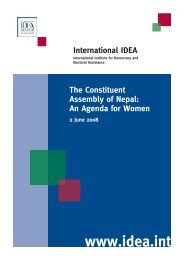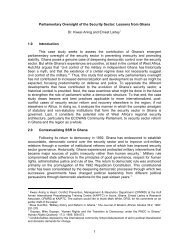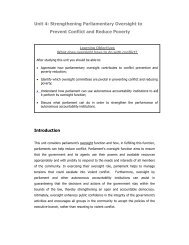Download PDF - Parliamentary Centre
Download PDF - Parliamentary Centre
Download PDF - Parliamentary Centre
- No tags were found...
You also want an ePaper? Increase the reach of your titles
YUMPU automatically turns print PDFs into web optimized ePapers that Google loves.
Parliaments, Politics and AIDSan opportunity to reflect not only on the findings but also to design practical interventions inlight of the recommendations. 2This research and the dissemination of its findings are part of a broader strategy by the CanadianPC and IDASA-GAP to build a critical mass of MPs who will play a prominent role in theanalysis, framing and evaluation of the national responses to HIV/AIDS.1.3 Rationale for the researchThe primary goal of the research was to identify ways to improve the overall effectiveness of theHIV/AIDS responses in the participating countries. A complex set of cultural, social, economicand political factors converge to create an environment where people are both vulnerable andsusceptible to HIV/AIDS. As a result, researchers and AIDS activists advocate for a multi-sectoralresponse so as to harness optimal resources (including human, financial and infrastructure) andexpertise.While a multi-sectoral approach attempts to be as inclusive as possible of government,non-government and civil society institutions, parliaments are conspicuously absent. Yet, thisresearch illustrates that parliaments, as representative institutions with law-making and oversightfunctions as their core business, can make a positive contribution to the effectiveness ofthe HIV/AIDS response.Government leads the response to HIV/AIDS. In all of the participating countries, the Executiveinforms the process of analysis of the pandemic, guides the development of the responses andmonitors those responses. In many instances, non-state actors assist government in implementingthe responses, but government remains the lead agency. On the other hand, parliaments havea moral and legal authority to monitor government business. This is part of their core businesswithin the democratic governance framework.Parliaments should therefore play a central role in assessing the status quo and the impactof HIV/AIDS and influencing the responses. This makes HIV/AIDS one of the thematic areas forthe application of the more objective functions of parliaments, i.e. law-making and oversight.Parliaments can ensure that HIV/AIDS remain a priority agenda item on the government businessprogrammes and that all government sectors are involved in the implementation and monitoringof their respective programmatic and budgetary responses.The assertion is that the considered and effective involvement of parliament in the pandemictranslates into a more effective response to HIV/AIDS and therefore adds value to the maintenanceof democracy, resulting in a society able to cope much better with the impact of thepandemic.Placing any limitation on the role of parliaments in determining HIV/AIDS priorities underminesan effective response to HIV/AIDS and undermines the power of democratic governance.The weakened democracy may then continue to be a feature of the post-AIDS society.In spite of the importance of parliaments in ensuring good democratic practice, researchersfrom all the participating countries had difficulty finding a significant body of literature


